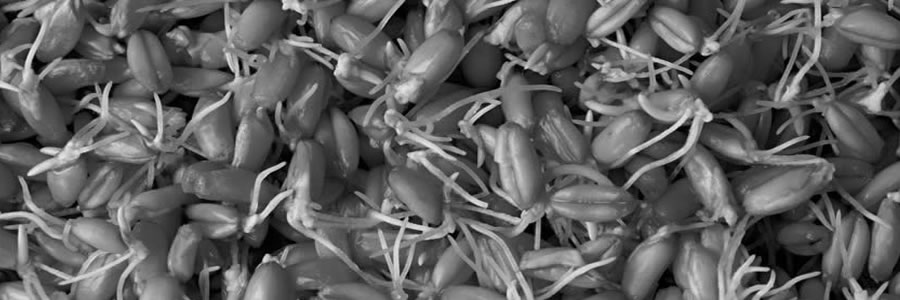Ask Doctor Jack & Mary is a monthly feature where we round up the best questions we’ve been asked, and turn it into consumable information for our readers and listeners. Have a question for Dr. Jack & Mary? Ask Here
“What to you think about sprouted grain pasta and bread?” – J. W.
J. W.,
The standard answer for this is simply, “Grain for gain”. Cattle ranchers know what to feed their steer the last three months of its life before processing. Grain; lots of it to fatten up the animal. They do not get fat on pasture grass, but they do on grains. If you want to put on weight, eat grains. Most people will either gain weight slowly or not lose the weight they want when they eat grains that have not been sprouted first. Most “sprouted” grain whatever, is usually mixed with flour in order to make bread or pasta, so the milled grain is still present even though there might be some advantage to sprouted grain present in the mix.
Sprouting changes the chemical makeup of the grain by turning the grain into a vegetable, so to speak. Enzymes are activated by the sprouting process but are promptly destroyed by baking the bread or boiling the pasta, so the proposed health benefits of the sprouts are reduced by heat. Is there an advantage to using sprouted grains in bread or pasta…probably so, but does it offset the problem with weight gain for grain sensitive people? Probably not.
“Dr. Jack, after listening to you on the radio for many years, I had a disagreement with my neighbor. He said it is better to have a alkaline system than an acid system. I said it was better to have an acid system than a alkaline system. Who is right?” – Jim W.
Jim,
Guess What? You are both right!
Here is the reality of your question: the saliva in your mouth is both acid and alkaline at different times. It depends on what you have eaten minutes to hours previous and the collective flora from your mouth to your butt. The saliva is usually alkaline when you are eating because the digestive enzyme amylase that comes from your salivary glands, that digests carbohydrates, works in an alkaline environment. As you chew your food, the mixture becomes more and more alkaline because of the amylase.
Then what happens when you swallow? The mixture falls into a very acidic stomach. True stomach acidity, in a healthy person, runs around 1.5-2.5 pH. Quite acidic in order to break down proteins. The acid has little effect on the carbohydrates because the amylase is going dormant in the acid stomach so carbohydrate digestion slows down. When the stomach acidity reaches 2.0 pH or less, pepsin, another powerful protein digester is released from the stomach wall to help the hydrochloric acid breakdown the proteins.
When the stomach mixture has become sufficiently acidified the contents are released into a very alkaline environment called the duodenum, the first section of the small intestine, where very alkaline chemicals and enzymes are mixed with the digesting mixture to neutralize the acidity from the stomach and continue the work of protein, fat, and carbohydrate digestion so the entire mixture can be absorbed through the remaining sections of the small intestine, the jejunum and the ilium.
When the final processes of digestion have finished, the chyme, which is what this mixture is now called, is moved through the iliocecal valve, near the appendix, and into the first section of the large intestine called the cecum, where once again an acid environment occurs. It is acidic because bacteria cannot live in acid. This is elementary microbiology. Bacteria and viral microbes thrive in alkalinity. When we would grow bacteria in microbiology class to discover the different strains that live on hallway banisters and drinking fountains, we would put apple or lemon juice, which contain acetic acid, in the petri dishes and in minutes the microbes would be destroyed.
When the colon becomes alkaline, bacteria flourish and can lead to cancer. This was established in many studies out of South Africa years ago. Your skin is acidic. In fact it is referred to as the “acid mantle”. It is that way to destroy the countless numbers of bacteria and viral strains that you pick up continuously 24/7, that populate your body’s covering head to toe. Also your urine is acidic to destroy any bacteria trying to grow in the bladder. When the urine turns alkaline, you will get a UTI (urinary tract infection) almost all the time.
This is a long answer I know. But it is important, I believe, to understand basic human physiology.
There are parts of the body that only function in an alkaline condition, just as there are parts that only function in an acid condition. You need both, and both will buffer the other when things start to get out of balance such as the blood that is just barely alkaline.
So in conclusion…it all depends on where you are talking about…the mouth, the stomach, the small intestine, the large intestine, the skin, the blood, the bladder? Both are essential.


Thanks for the information on acid/alkaline digestion. It is very informative. I have been fighting hives for years – undetected reason. I have noticed when my hives are activated, I have indigestion and heartburn – maybe caused from excess acid. I am in the process of changing my diet to more alkaline. Do you think my hives could be caused by excess acid in my system? I wonder if I am on the “right track”. I have been taking Xolair injections for over two years and recently have had to add anti -histamines and Doxepin to help control the hives. It would be so nice if I could get off of all… I have seen 5 Dermatologist – non could determine the cause. I would so appreciate your thoughts on this. Thank you
Thank you for your questions! We have a few suggestions that we think will make all the difference in your heartburn problem – it will be a foundational solution that will go to the heart of the matter. Make sure that you listen to the whole Podcast #90 “Fire In The Belly – Eliminating Heartburn in 30 Days (or less)”, above. That would be a great place to start.
This may sound counter-intuitive but your heartburn probably stems from too little acid, not too much. This is fully explained in the podcast mentioned above. Without sufficient amounts of acid, the food in your stomach remains there for hours, not being able to be released into the small intestine, forming a volcano of gas, unnatural acids, bloating, and pressure. Thousands of our patients find quick relief when they take 3 or 4 Zypan and 2 or more Multizyme following a meal.
As far as the cause of allergies/hives, they can intensify if the body is in a hyperalkaline state. If your urine or saliva pH is above 7, you can decrease the alkalinity by supplying mineral acidifiers such as CalAmo (3-6/day). Once you get the saliva normal, down to seven, then it will be easier to control histamine. You will want to use Antronex (6/day) in conjunction with CalAmo to control histamine. Antronex acts as a natural antihistamine, it dilates the portal vein which improves circulation to the liver so that it can quickly/efficiently metabolize histamines and other inflammatory chemicals that contribute to hives.
Thanks for your questions and thanks for listening.